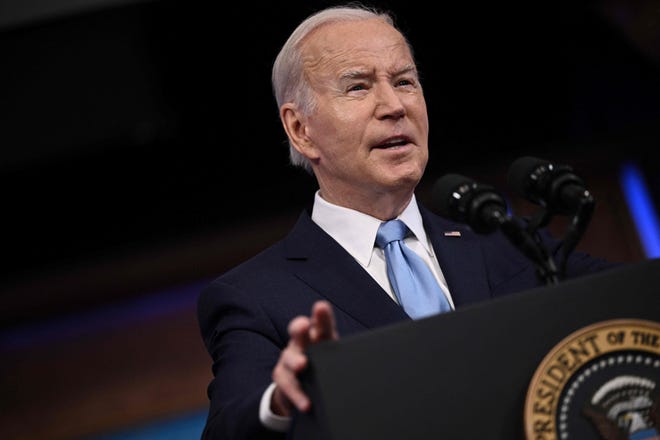
WASHINGTON − The last time Joe Biden met with House Speaker Kevin McCarthy - 97 days ago - the president reiterated his long-held position that raising the debt ceiling is "not negotiable or conditional."
But as the two leaders meet at the White House again Tuesday, Biden faces increasing pressure to soften his stance on Republicans' demands for spending cuts ahead of a June 1 deadline to avoid a government default.
White House leverage is slipping
- The White House hoped that deep cuts to government programs proposed by Republicans would prove so unpopular that enough GOP members of Congress would side with the president for Congress to raise the debt ceiling without conditions.
- Instead, Republicans have stayed united. The Republican-controlled House voted last month to approve a bill that would increase the debt ceiling by $1.5 trillion while cutting $4.5 trillion in domestic spending.
- Biden has accused House Republicans of holding the country "hostage" in order to pass extreme spending cuts.
- Yet 43 Republican senators - including Republican Leader Mitch McConnell - sent a leader to Senate Majority Leader Chuck Schumer on Monday opposing any package to increase the debt ceiling that doesn't include spending cuts. It means a bill to raise the debt ceiling without spending concessions would lack the 60 votes needed to avoid a filibuster in the Senate.

Sides remain far apart
White House press secretary Karine Jean-Pierre on Monday reaffirmed Biden's unwillingness to negotiate the debt ceiling, arguing that House Republicans are "manufacturing a crisis" over raising the debt ceiling, which she noted Congress has raised 78 times since 1960.
"The president is not going to change course here," Jean-Pierre said. "We've been very, very clear here that they need to do their job."
McConnell, Schumer and Democratic House Leader Hakeem Jeffries will also attend the high-stakes meeting.
The two sides will open talks with little common ground besides the commitment of both parties not to touch Social Security or Medicare, the two biggest drivers of national debt that's exploded to $31.4 trillion.
The McCarthy-backed bill, which passed the House by a 217-215 vote along party lines, would return discretionary spending to fiscal year 2022 levels and limit spending growth to 1% a year.
The White House has warned the proposal would mean deep slashes to education, child care, veterans benefits and other programs while crippling the administration's efforts to expand domestic manufacturing. Biden has vowed to veto the bill, which has little chance to get through the Democratic-controlled Senate.
Ahead of the meeting, the White House and McCarthy both rejected the option of a short-term extension of the debt ceiling to allow more time to pass a larger increase.
“A short-term extension is not our plan either,” Jean-Pierre said. “This can be easily resolved. This is a man-made crisis that the speaker is leading.”
Countdown to June 1
- The debt ceiling is the maximum amount the U.S. government can borrow to meet existing financial obligations.
- Treasury Secretary Janet Yellen last week warned the U.S. is on pace to run out of money in early June, perhaps as early as June 1, unless Congress takes action to raise the debt ceiling.
- Yellen said the U.S. would not have money to make Social Security and Medicare payments if the country goes into default. Economists fear a chain of events that could plunge the country into a recession.

What are Biden's other options?
To end the impasse, one possible track for Biden could be to entertain spending cuts in separate legislation if McCarthy agrees to support raising the debt ceiling by itself.
"Of course, it’s appropriate to have negotiations about the budget, about spending priorities," Yellen said Sunday on ABC's This Week. "But we do need to raise the debt ceiling to avoid economic calamity."
Yet Republicans have shown no signs they are willing to detach their spending demands from debt ceiling legislation.
Jeffries began the process last week of pursuing a discharge petition - a rarely used procedural move to get a bill out of committee − to force a vote on raising the debt ceiling. But Democrats would need support from five House Republicans for a debt ceiling bill to pass. That level of support doesn't exist at the moment.
As a last resort, Biden could also choose to invoke the 14th Amendment, arguing the debt limit is unconstitutional and the U.S. is required to continue issuing new debt to pay bondholders. In an interview Friday, Biden told MSNBC, "I've not gotten there yet" when asked about the 14th Amendment.
Reach Joey Garrison on Twitter @joeygarrison.
Source link








